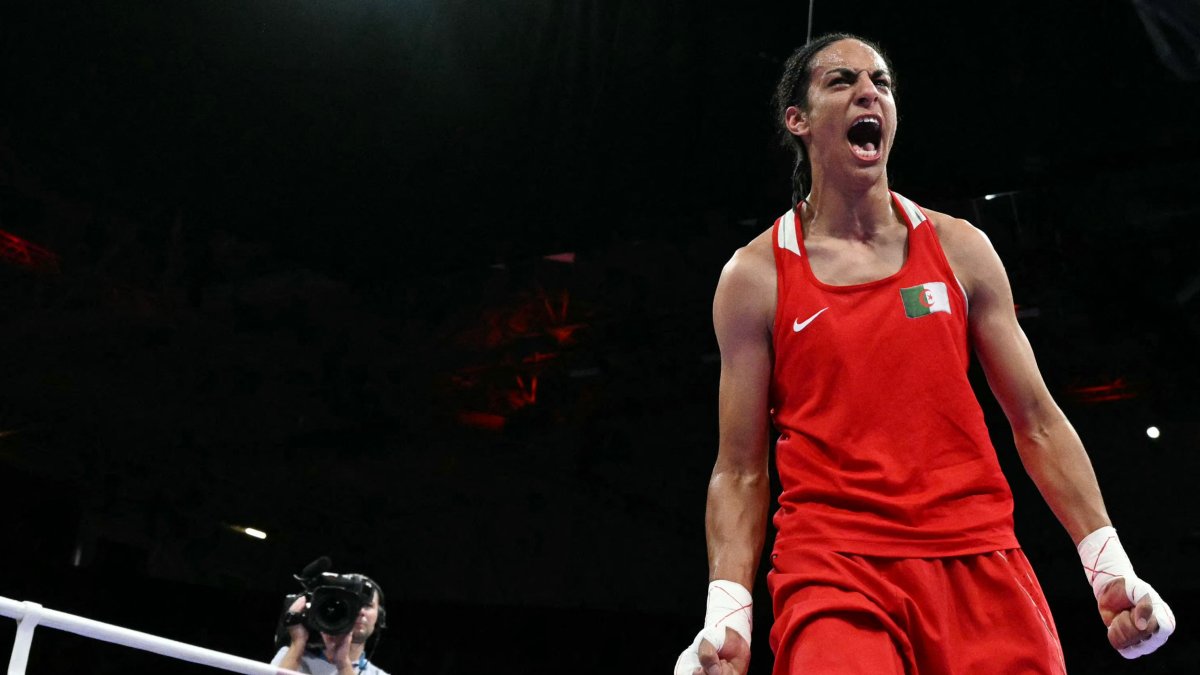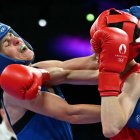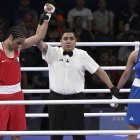Dismantling the woke narrative: facts about the boxers with 'XY' chromosomes who have already secured medals at the 2024 Olympic Games
Imane Khelif and Lin Yu-ting are not trans people, but neither are they "high testosterone women." Their case is a challenge for the sporting world and the safety of female athletes.

Algeria's Imane Khelif, who is at the center of the controversy
"When I fought her, I felt it very out of my reach, I was very hurt by her punches. Never in my 13 years as a boxer had I ever felt like that, not even in my sparring with men. Thank God, that day I got out of the ring safely and it's good that they finally realized it," are the words of the talented Mexican boxer Brianda Tamara Cruz, who at the end of 2022 stepped into the ring with Algerian Imane Khelif, who defeated her convincingly in the finals of the Golden Belt Series in Guadalajara.
At the time, Khelif was not yet controversial, nor was she in the intense eye of public opinion. But that is no longer the case.
The Italian boxer Angela Carini withdrew from the fight against Khelif after 46 seconds, tearfully accusing Khelif of unbearable blows. Afterwards, many questioned the International Olympic Committee (IOC) for allowing an athlete with XY chromosomes to participate in the Paris 2024 Olympic Games after failing the gender tests for the 2023 World Boxing Championships organized by the International Boxing Association (IBA), in a case very similar to that of Taiwanese boxer Lin Yu-ting, also involved in the controversy.
However, since many critics began to raise their voices against the IOC and its admission rules, a communication and political battle began to be fought around the world that is not helping to objectively address the situation on the safety of athletes and respect for people with atypical biological conditions.
In the woke narrative, those criticizing Khelif and Yu-Ting's participation are part of an unfair "hate" and "transphobia" campaign against female boxers, a talking point adopted even by the IOC, which has accused the international media of attacking the athletes with "misinformation," without specifying what the misinformation is. However, it is also true that many attacks against both athletes are unfounded.
Lawyer Irene Aguiar, a specialist in sports law and a reference in matters of sports ethics and the impact of biology on competitiveness and safety in the disciplines explains: Khelif is not a "trans" person, she is not a man who identifies as a woman and made a gender transition clearly taking advantage of her physical advantages, as happened in emblematic cases such as that of swimmer Lia Thomas. On her identity card, Khelif is recognized as a woman and all her life has participated in women's boxing competitions. Even her father told the media that she was raised as a girl. However, the Algerian is also not, as some sports journalists have said, "a woman with high levels of testosterone."
Both statements are incorrect. Here are the facts:
Female boxers with XY chromosomes and conflict between the IOC and the IBA
On August 3, a fact was revealed that upended the International Olympic Committee's narrative. Fourteen months ago, in June 2023, the IBA warned the organization in a message that the Algerian athlete underwent sex testing and both "concluded that the boxer's DNA was that of a male composed of XY chromosomes."
Prior to the revelation of the letter, the IBA had issued a statement suggesting that both Khelif and Yu-Ting had failed gender tests and thus both were disqualified from the 2023 world championships.
"On 24 March 2023, IBA disqualified athletes Lin Yu-ting and Imane Khelif from the IBA Women’s World Boxing Championships New Delhi 2023. This disqualification was a result of their failure to meet the eligibility criteria for participating in the women’s competition, as set and laid out in the IBA Regulations. This decision, made after a meticulous review, was extremely important and necessary to uphold the level of fairness and utmost integrity of the competition."
In the statement, the IBA clarified several details, although without mentioning biological illegibility in order to, supposedly, respect the privacy of the athletes. The first was that none of the boxers underwent a testosterone test but a "recognized test, whereby the specifics remain confidential."
"This test conclusively indicated that both athletes did not meet the required necessary eligibility criteria and were found to have competitive advantages over other female competitors," the IBA said.
The decisions were based on two tests, one conducted during the IBA Women's World Boxing Championships in Istanbul 2022 and another conducted during the IBA Women's World Boxing Championships in New Delhi 2023. Both decisions became legally binding because Lin Yu-ting did not appeal the IBA decision to the Court of Arbitration for Sport (CAS) and Imane Khelif initially appealed the decision to the CAS, but later withdrew it.
However, the IOC decided not to listen to the IBA's warnings, opening a credibility war against the organization for doing "irregular sex testing."
In fact, Mark Adams, IOC spokesman, confirmed on August 4 in a lengthy press conference the existence of the warning letter and openly assured that his organization rejected its contents because they are not in favor of ad hoc sex testing. This later drew the IBA's response.
"First off, it won’t surprise you to know I’m going to repeat the line that those tests are not legitimate tests(...) So there was indeed a letter. I can confirm that. But the tests themselves, the process of the tests, the ad hoc nature of the tests are not legitimate. And you will also expect me to tell you that I’m not going to discuss the individual intimate details of athletes in public, which I think is pretty disgraceful for those who have leaked that material, frankly. To be put in that position must be awful. On top of all of the social media harassment that these athletes have had."
El COI confirma que recibieron la carta de la IBA en la que informaban de que Khelif y Yu-ting tenían cromosomas XY.
— Irene Aguiar (@IreneAguiarG) August 4, 2024
Confirman que se les llevó a cabo un test de sexo, pero no lo consideran “legítimo”.
“No son legítimos porque no había razón para hacerlos. El test fue realizado… pic.twitter.com/MsEYclNOOJ
During the conference, Adams made it clear that the IOC is not in favor of sex testing and they consider it sufficient that both Lin Yu-ting and Imane Khelif have female IDs, despite the unsettled climate and the complaint of several athletes who competed against both of them at these Olympics.

Sports
A Bulgarian Boxer Protests Strongly After Being Eliminated by 'XY' Chromosome Athlete Lin Yu-ting
Emmanuel Alejandro Rondón
But the IOC press conference, which in the previous days had already taken a position, only generated more controversy, with the IBA organizing its own response to the media in another press conference that turned out to be hostile.
Specifically, the protagonist of the press conference was Ioannis Filippatos, former chairman of the IBA medical committee, who claimed this Aug. 5 that "anomalies" were detected in the 2022 blood tests on both athletes.
"According to the medical result and the blood result, the laboratory says that these boxers are men. We have two blood tests with male karyotype. This is the laboratory answer (...) Medicine is knowledge, it is not opinion.... A passport can give us the opportunity to be men, and tomorrow, when I return to Athens, I can go to my government and change my name from Ioannis to Ionnia. Does that mean that tomorrow I will be a woman? Please, nature and the biological world do not change."
Now, with both organizations throwing darts at each other, the situation has become increasingly tangled and complex, especially since the background information shows that the IOC and the IBA have been at war since 2019, when the IBA was suspended as the leading body in Olympic boxing.
Both organizations, moreover, have completely different eligibility criteria. The IBA expressly says in its regulations that a woman is a person who presents XX chromosomes and in the IOC, instead, the criteria are outlined in the Boxing Unit, where the categories of "men" and "women" are mentioned, but no requirement or biological eligibility criteria are established for these. Only age, weight and nationality requirements are established.
Who is right?
At this point, it is clear that the IBA defends a position on the concern of safety in female athletes while the IOC, on the other hand, seeks that athletes who present atypical conditions in their genetics should not be stigmatized.
However, it is very difficult to determine the real condition of the boxers Khelif and Yu-Ting if there are no public medical examinations, a situation that could also compromise the privacy of the athletes, who are in a very uncomfortable position. In that sense, specialist Irene Aguiar explained what could be the conditions of these athletes, denying the woke narrative adopted by the IOC that the boxers, in reality, are women and are being targeted by a hate campaign.
"Most likely, but of this there is no reliable source information, is that she has some anomaly of sexual development (ADS or DSD) of XY karyotype. This would explain that the sex recorded in the passport is female, due to having genitalia of that aspect at birth, and has therefore been registered that way. It would be like Semenya's case: biologically a male with an ADS that makes his genitalia ambiguous at birth and he is registered as female. Semenya's ADS is 5-ARD 46XY (confirmed by the CAS, the ECtHR and, with respect to having testicles, by Semenya), but it is unknown if this is also the case for Khelif."
3. Lo más probable, pero de esto no hay ninguna información de fuente fiable, es que tenga alguna anomalía del desarrollo sexual (ADS o DSD) de cariotipo XY. Esto explicaría que el sexo que consta en el pasaporte sea femenino, por tener genitales de ese aspecto en el nacimiento,… https://t.co/Q92pcgMgML
— Irene Aguiar (@IreneAguiarG) August 1, 2024
Aguiar refers to the case of the South African athlete Caster Semenya, a hyperandrogenic person who was prohibited from competing because of the high testosterone levels and physical advantages she had over her female peers due to her biological condition.
At this point, it is imperative to remember that the IOC never denied at any time that the aforementioned athletes have XY chromosomes. In fact, when spokesman Bach said publicly "I repeat, here, this is not a DSD case, this is about a woman taking part in a women’s competition, and I think I have explained this many times," the organization itself had to clarify its sayings: "What was intended was: 'But I repeat, here, this is not a transgender case'."
CORRECTION
— IOC MEDIA (@iocmedia) August 3, 2024
In today’s IOC – Paris 2024 press briefing, IOC President Bach said:
“But I repeat, here, this is not a DSD case, this is about a woman taking part in a women’s competition, and I think I have explained this many times.”
What was intended was:
“But I repeat, here,…
However, unlike Semenya, who competed in track and field, with Khelif and Lin Yu-ting there is an additional problem: boxing is a contact sport where the integrity of female athletes is at risk.
In boxing, competitive parity in terms of weight and biological conditions has never been taken lightly historically and the IOC, with its stance, based on privacy protection and non-discrimination,is setting a precedent where safety and competitiveness are not being put first.
While all this is being discussed, Khelif and Lin are set to contest the Olympic semifinals in their respective categories this Tuesday and Wednesday. Both have already secured medals for their countries.



























